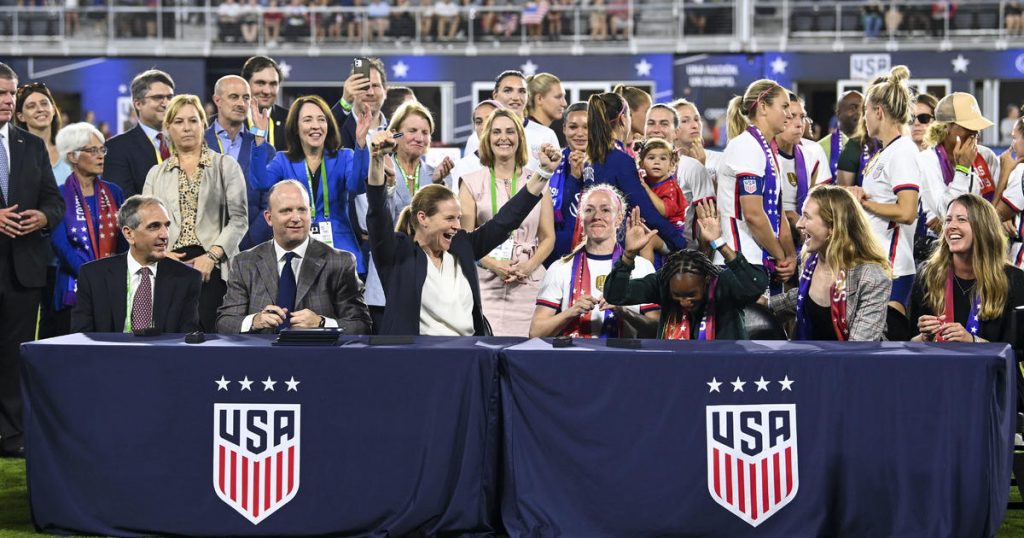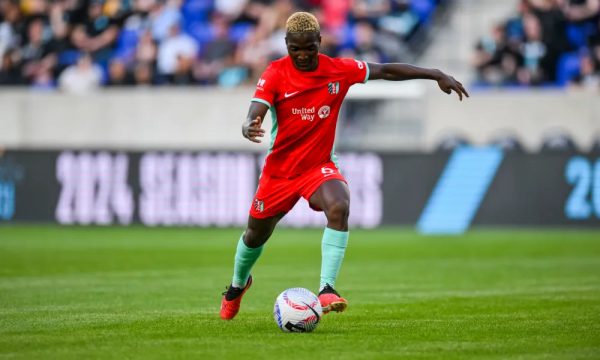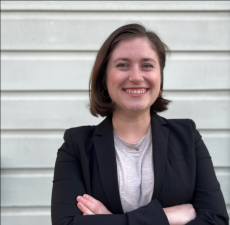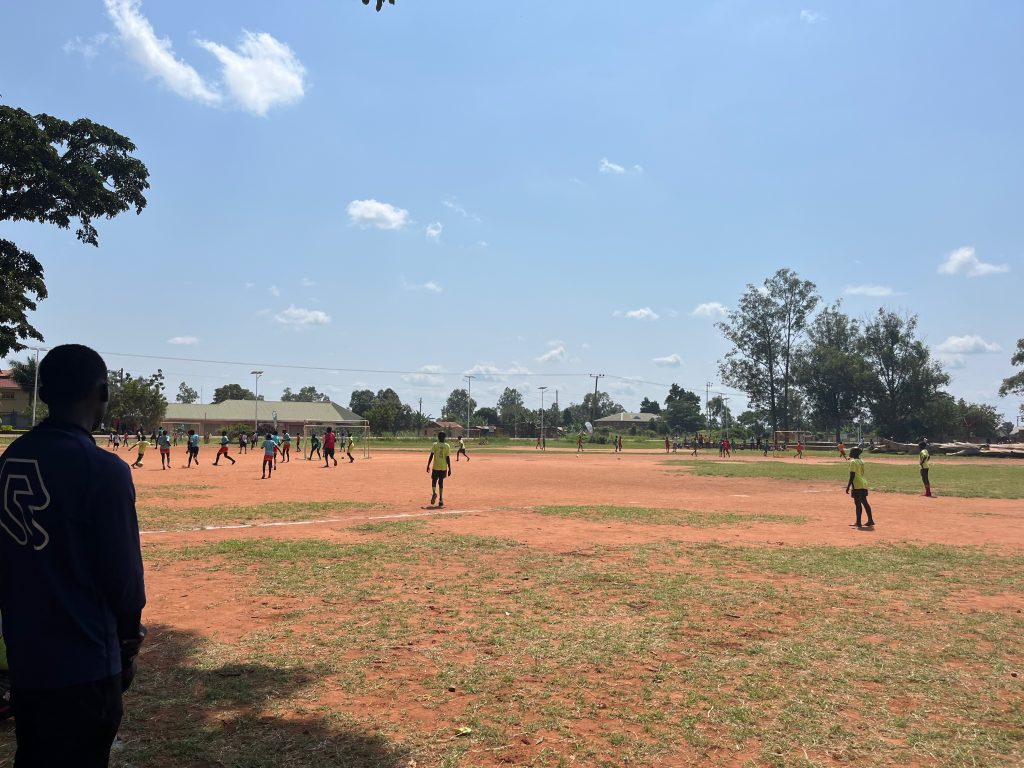In addition to his role at GDPU, Faruk is the founder and director of Ability Sports Africa – the only non-profit in Uganda aimed at supporting youth with disabilities to play sports. Faruk invited me to volunteer with his organization, and every Sunday morning since I’ve spent at Pece Primary School helping coach the only girls team in the league.
Girls face extra cultural, social, and safety barriers to play sports in Uganda. Girls are expected to contribute to household responsibilities, like fetching water, cooking, and caring for siblings, leaving them with less unburdened time than boys. It can still be social taboo for girls to play sports among some of the more traditional communities. Whereas boys can easily change into their uniforms in front of everyone, the girls have to use the latrines at the school. But there isn’t enough room for all of them, so many girls change in the open air between a wall and the bathroom stances. I’ve watched the boys often lurk closer and closer to the girls as they change (I now stand outside the latrines like a watchdog, staring down and telling off any boy who comes near).
For these girls to even attend a soccer training is a minor miracle in itself.
During my first Sunday with the team, “Director Faruk” introduced me and told the girls that he “brought them a woman coach from America.” The girls all looked curiously at this strange mzungu with a baseball hat in front of them. I was the only woman (and only white person) of all the coaches, volunteers, and parents present, adding to the rightful hesitancy. I helped lead the girls through warm ups, encouraged them to cheer for their teammates, and gave everyone supportive high fives. They are still learning positioning and how to pass, so the games look a bit like bees swarming to the ball.
After the game, the girls asked me a whole list of questions that they had probably been keeping inside for the last few hours. I’ve had some practice now fielding questions and have learned to respond in a way that is more aligned with the cadence of a Ugandan. The conversation went something like this:
Where are you from? United States, on the other side. What state? Originally I’m from outside of New York City – one hour drive by car. It’s a small town, smaller than Gulu. Now I live in Washington D.C. where I go to university. Who is in your family? I have a mother, father, and brother. My brother is called Nicholas. Are you the first born or the follower? I am the first born and my brother follows me. How many years are you? I am 27. What do you study? I’m getting a master’s degree in development studies. But my university degree is in engineering. Why are you in Gulu? I am working for Gulu Disabled Persons Union for the summer with Director Faruk. How long are you in Uganda for? I’ve been here for a couple weeks. I will leave in August to go back to school. Why don’t you stay here forever? I have to go back to school! Can I touch your hair? Yes, that’s ok. Why is your hair like that? My hair is too slippery – it won’t braid like your mom’s hair. So, I put it in a ponytail like this.*
And of course, I returned the favor:
Do you go to school? Who is in your family? What do you want to be when you grow up? Lawyer, doctor for babies, doctor for animals, teacher, football coach. Who is your favorite football player? Messi. Ronaldo. Daka. Who is your favorite women’s football player? I don’t know. What do you mean? You don’t know one women’s football player?
Women don’t play football.
I paused and stared at the 10, very curious girls staring back at me. And it almost brought me to tears. I grew up admiring the soccer players of the United States Women’s National Team (USWNT); women who showed that being a girl means being strong. The USWNT uses their platform to fight for social justice. Their fight for equal pay has and will continue to positively impact other women athletes and women in any professional. The team has inspired girls and boys alike. And that’s just one team – there is a growing movement in the United Kingdom and Japan and Spain and Australia and Nigeria and Zambia to support their women athletes.

USWNT Signing the Equal Pay Agreement in 2022 (CBS News)
While I understood that having a WNT supported by your country’s federation is rare, I hadn’t spent a lot of time thinking that there must be so many places in the world where girls don’t even know that professional women soccer players exist. This gave some context to the comment that one girl wants to be a football coach when she grows up, not a player, because she doesn’t think a woman can be a professional football player.
This summer has been a lesson in many things, one of which is unpacking new layers of my privilege. It is a privilege to have role models that are women athletes, and even more so to have these role models look like you. But at a baseline, it is a privilege to just know that these role models exist.
Back to my conversation with my team:
Yes, yes there are professional women’s football players! There are so many of them! There are leagues all across the world for professional teams and there’s a Women’s World Cup. And there are players not just from the other side – from Africa, too.
I quickly pulled up pictures on my phone of professional African players I knew of in the National Women’s Soccer League (NWSL) in the United States. I showed them Barbra Banda, a forward from Zambia on the Orlando City Pride who is arguably the best striker in NWSL right now. I showed them Temwa Chawinga, a Malawian player on the Kansas City Current whose team is at the top of the NWSL table. I showed them a picture of the Washington Spirit, the DC NWSL team, who have three superstar strikers in Trinity Rodman, Croix Bethune, and Ouleymata Sarr; three Black women with hair in braids, braids that are probably similar to the mothers and aunties of the girls on our Gulu soccer team.

Temwa Chawinga playing for the Kansas City Current (Pro Soccer Wire)
And in that moment, I unlocked a whole new privilege: to watch the moment someone’s world becomes wider; to watch young, Black, African girls who love football find new role models who look like them. Spending time with this team has and will continue to be one of the most impactful experiences of my time in Gulu.
—
* The “other side” is a phrase used to denote distance. It is not akin to the connotations of “the other side of the tracks” that we have in the United States. It could refer to the other side of town, the other side of the district, or somewhere outside of Africa.
The idea of “following” and “first born” are used to describe sibling order. If you are the oldest sibling, you say that you are the “first born” and other siblings “follow you.” If you are a younger sibling, you say that you “follow” your older sibling or are the “follower”.
Many people, adults and children alike, are fascinated with my hair. It makes sense – my hair is light brown and straight as a pin. People often ask me why it’s not in tight braids or twists common for adult women in Uganda, and I have to explain that my hair won’t hold that shape.
Posted By Julia Davatzes
Posted Jul 3rd, 2024



5 Comments
Iain Guest
July 3, 2024
This blog is an absolute riot although Coach Julia seems a bit scary! Remind me not to get on the wrong side of her….. Having coached my daughter’s soccer team through ten tumultuous seasons, I am totally attuned to your adventure and fervently hope that you and Faruk can create a team of champions. Very nice!
Musemafaruk
July 3, 2024
This is so inspiring 🙌 ❤
Bobbi Fitzsimmons
July 6, 2024
I love this Julia. You have shared possibilities with these young women. You are so right about it being a privilege to introduce others to things they never even dreamed were possible. You seem to be the perfect person to do this. Your knowledge of all these wonderful professional athletes impressed me too. And I totally get it about the hair.
Julia Davatzes
July 7, 2024
Faruk – YOU are so inspiring! These girls are lucky to have you creating space for and encouraging them.
Mary Ellen Cain
July 8, 2024
Julia, what a great extra-curricular dimension you’ve added to your summer assignment! It’s a terrific way to share your coaching talents, get to know the community girls, learn more about their experiences,and broaden their outlook of the world on the other side. Not to mention how it deepens your understanding of your own privileged background. Can’t wait to hear more about this!